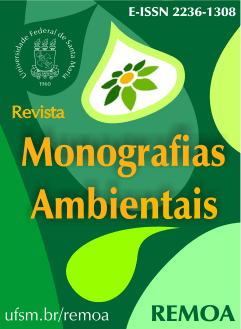Análise do programa de qualificação profissional de agricultores – Emater, sob a perspectiva midiática
DOI:
https://doi.org/10.5902/2236130814196Palabras clave:
Emater, Produtor rural, ExtensionistaResumen
A Emater é um órgão do governo estadual que tem como objetivo desenvolver o meio rural por meio de programas, sempre dando prioridade e subsídios para os pequenos agricultores, objetivando manter eles no campo, bem como as suas gerações futuras. Mediante isso a Emater criou o Programa de qualificação profissional de agricultores, cujo abrange inúmeras cidades do Estado com cursos voltados as mais diversas áreas, sempre aliando a prática com a teoria, por meio de uma linguagem clara e comum, o extensionista busca trazer novas formas de se produzir, gerando uma maior renda para os produtores. Todo esse processo se da de forma lenta, e alinhando a realidade local da comunidade. Com um poder de mídia primária forte, e clara o programa vem trazendo resultados positivos, e se mostrando extremamente eficaz no que diz respeito a trazer novas fontes de renda com vista a manter o produtor rural no campo.
Descargas
Citas
BAITELLO JUNIOR, Norval. O tempo lento e o espaço nulo: Mídia primária, secundária e terciária. Associação Nacional dos Programas de Pós-Graduação em Comunicação. São Paulo, 1993.
BRASIL. Empresa de Assistência Técnica e Extensão Rural-RS. Disponível em: http://www.emater.tche.br/site/index.php. Acesso em: 21 de maio de 2014.
EMATER/ASCAR. Programa de qualificação profissional de agricultores (regional Ijuí). Ijuí, 2006. 10p. (Relatório técnico).
EMATER/ASCAR. Programa de qualificação profissional de agricultores (regional Erechim). Erechim, 2008. 10p. (Relatório técnico).
EMATER/ASCAR. Programa de qualificação profissional de agricultores (regional Caxias do Sul). Caxias do Sul, 2009. 10p. (Relatório técnico).
FREIRE, Paulo. Pedagogia do Oprimido. 17º ed. Paz e Terra: Rio de Janeiro, 1987.
HENRIQUES, Márcio S. et. alii. Comunicação e Estratégias de Mobilização Social.2.ed. Belo Horizonte: Autêntica, 2004.
HENRIQUES, Márcio S, BRAGA, Clara S. SILVA, Daniela. B, C. MAFRA, Rennan, L, M. Comunicação e Estratégias de Mobilização Social. 2.ed. Belo Horizonte: Autêntica, 2002.
TORO, José B. & WERNECK, Nísia M. D. Mobilização Social: um modo de construir a democracia e a participação. 2.ed. Belo Horizonte: Autêntica, 2004.
TUFTE. Thomas. O renascimento da Comunicação para a transformação social – Redefinindo a disciplina e a prática depois da ‘Primavera Árabe’. Intercom. São Paulo, v.36, n.2, p. 61-90, jul./dez. 2013.
Descargas
Publicado
Cómo citar
Número
Sección
Licencia
Ethical guidelines for journal publication
The REMOA is committed to ensuring ethics in publication and quality of articles.
Conformance to standards of ethical behavior is therefore expected of all parties involved: Authors, Editors, Reviewers, and the Publisher.
In particular,
Authors: Authors should present an objective discussion of the significance of research work as well as sufficient detail and references to permit others to replicate the experiments. Fraudulent or knowingly inaccurate statements constitute unethical behavior and are unacceptable. Review articles should also be objective, comprehensive, and accurate accounts of the state of the art. The authors should ensure that their work is entirely original works, and if the work and/or words of others have been used, this has been appropriately acknowledged. Plagiarism in all its forms constitutes unethical publishing behavior and is unacceptable. Submitting the same manuscript to more than one journal concurrently constitutes unethical publishing behavior and is unacceptable. Authors should not submit articles describing essentially the same research to more than one journal. The corresponding author should ensure that there is a full consensus of all co-authors in approving the final version of the paper and its submission for publication.
Editors: Editors should evaluate manuscripts exclusively on the basis of their academic merit. An editor must not use unpublished information in the editor's own research without the express written consent of the author. Editors should take reasonable responsive measures when ethical complaints have been presented concerning a submitted manuscript or published paper.
Reviewers: Any manuscripts received for review must be treated as confidential documents. Privileged information or ideas obtained through peer review must be kept confidential and not used for personal advantage. Reviews should be conducted objectively, and observations should be formulated clearly with supporting arguments, so that authors can use them for improving the paper. Any selected referee who feels unqualified to review the research reported in a manuscript or knows that its prompt review will be impossible should notify the editor and excuse himself from the review process. Reviewers should not consider manuscripts in which they have conflicts of interest resulting from competitive, collaborative, or other relationships or connections with any of the authors, companies, or institutions connected to the papers.






